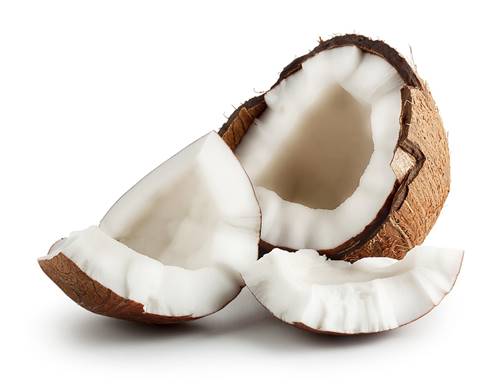Is coconut oil good for your skin?
How to use it, Benefits
How to use Coconut Oil on your skin. Pros and Cons.
Fact Checked
×All the content published in our website is fact checked to validate its accuracy.
Visit our guidelines web page to learn more about our strict processes regarding how we review our content's sources: reliable and reputable journals, media websites, universities, colleges, organizations, and professionals.
Our articles are based on scientific evidence, and the references are included in its footnotes, which are clickable links to sound scientific papers.
First published: 16.Aug.2023
Overview
Coconut oil is an edible oil obtained from the coconut palm tree. It has been used for centuries as a moisturizer, hair conditioner and skin treatment in Southeast Asia.
Besides its use as food, it forms part of a wide range of natural plant-derived cosmetics. Virgin Coconut Oil (VCO), obtained using methods that preserve its antioxidant properties has many uses in hair and skin care.
Here we will review its benefits, uses and potential side effects as an ingredient in cosmetic formulations. You will also find a body lotion recipe that you can try out at home.
References and Further Reading
(1) Lin TK, Zhong L, Santiago JL, (2017). Anti-Inflammatory and Skin Barrier Repair Effects of Topical Application of Some Plant Oils. Int J Mol Sci. 2017 Dec 27;19(1):70. doi: 10.3390/ijms19010070. PMID: 29280987; PMCID: PMC5796020.
(2) Lima EB, Sousa CN, Meneses LN, Ximenes NC, Santos Júnior MA, Vasconcelos GS, Lima NB, Patrocínio MC, Macedo D, Vasconcelos SM, (2015). Cocos nucifera (L.) (Arecaceae): A phytochemical and pharmacological review. Braz J Med Biol Res. 2015 Nov;48(11):953-64. doi: 10.1590/1414-431X20154773. Epub 2015 Aug 18. PMID: 26292222; PMCID: PMC4671521.
(3) Jost X, Ansel JL, Lecellier G, Raharivelomanana P, Butaud JF, (2015). Ethnobotanical survey of cosmetic plants used in Marquesas Islands (French Polynesia). J Ethnobiol Ethnomed. 2016 Nov 29;12(1):55. doi: 10.1186/s13002-016-0128-5. PMID: 27899137; PMCID: PMC5129640.
(4) N. Jayathilaka, K.N. Seneviratne, (2022). Phenolic antioxidants in coconut oil: Factors affecting the quantity and quality. A review. Grasas y Aceites 73 (3) July-September 2022, e466 ISSN-L: 0017-3495 https://doi.org/10.3989/gya.0674211
(5) Rele AS, Mohile RB., (2003). Effect of mineral oil, sunflower oil, and coconut oil on prevention of hair damage. J Cosmet Sci. 2003 Mar-Apr;54(2):175-92
(6) Saxena R, Mittal P, Clavaud C, Dhakan DB, Roy N, Breton L, Misra N, Sharma VK, (2021). Longitudinal study of the scalp microbiome suggests coconut oil to enrich healthy scalp commensals. Sci Rep. 2021 Mar 31;11(1):7220. doi: 10.1038/s41598-021-86454-1. PMID: 33790324; PMCID: PMC8012655.
(7) Agero AL, Verallo-Rowell VM., (2004). A randomized double-blind controlled trial comparing extra virgin coconut oil with mineral oil as a moisturizer for mild to moderate xerosis. Dermatitis. 2004 Sep;15(3):109-16
(8) KN Satheeshan, BR Seema and AV Meera Manjusha, (2020). Development of virgin coconut oil based body lotion . The Pharma Innovation Journal 2020; 9(5): 96-101.
(9) F. Peedikayil, et al., (2016). Comparison of antibacterial efficacy of coconut oil and chlorhexidine on Streptococcus mutans: An in vivo study. J Int Soc Prev Community Dent. 2016 Sep-Oct; 6(5): 447-452. 2016 Oct 24. doi: 10.4103/2231-0762.192934
(10) Shilling M (2013). Antimicrobial effects of virgin coconut oil and its medium-chain fatty acids on Clostridium difficile. Antimicrobial effects of virgin coconut oil and its medium-chain fatty acids on Clostridium difficile
(11) Kligman A and Kwong T. (1979). An improved rabbit ear model for assessing comedogenic substances. British Journal of Dermatology, 100: 699-702
(12) Abel Francis, Anitta Shojan, (2019). Comedogenicity of Oils. International Journal of Contemporary Medical Research ISSN (Online): 2393-915X; (Print): 2454-7379 ICV: 98.46 Vol. 6:8 Aug. 2019.
(13) Zoe Diana Draelos, Joseph C. DiNardo, (2006). A re-evaluation of the comedogenicity concept. The Journal of the American Academy of Dermatology, Vol 54:3, p507-512, Mar 2006 https://doi.org/10.1016/j.jaad.2005.11.1058.
(14) Varma SR, Sivaprakasam TO, Arumugam I, Dilip N, Raghuraman M, Pavan KB, Rafiq M, Paramesh R, (2018). In vitro anti-inflammatory and skin protective properties of Virgin coconut oil. J Tradit Complement Med. 2018 Jan 17;9(1):5-14. doi: 10.1016/j.jtcme.2017.06.012. PMID: 30671361; PMCID: PMC6335493.
(15) Lin, T.-K.; Zhong, L.; Santiago, J.L., (2018). Anti-Inflammatory and Skin Barrier Repair Effects of Topical Application of Some Plant Oils. Int. J. Mol. Sci. 2018, 19, 70. https://doi.org/10.3390/ijms19010070.
(16) Taylor C. Wallace, (2019). Health Effects of Coconut Oil—A Narrative Review of Current Evidence. Journal of the American College of Nutrition, 38:2, 97-107, DOI: 10.1080/07315724.2018.1497562.
(17) Katherine Anagnostou (2017). Coconut Allergy Revisited. Children (Basel). 2017 Oct; 4(10): 85. 2017 Sep 29. doi: 10.3390/children4100085
(18) Australasian Society of Clinical Immunology and Allergy (ASCIA) 2019. Coconut Allergy.
About this Article
Is coconut oil good for your skin? How to use it, Benefits, A. Whittall
©2023 Fit-and-Well.com, 16 Aug. 2023. Update scheduled for 16 Aug. 2025. https://www.fit-and-well.com/wellness/coconut-oil-for-skin.html



